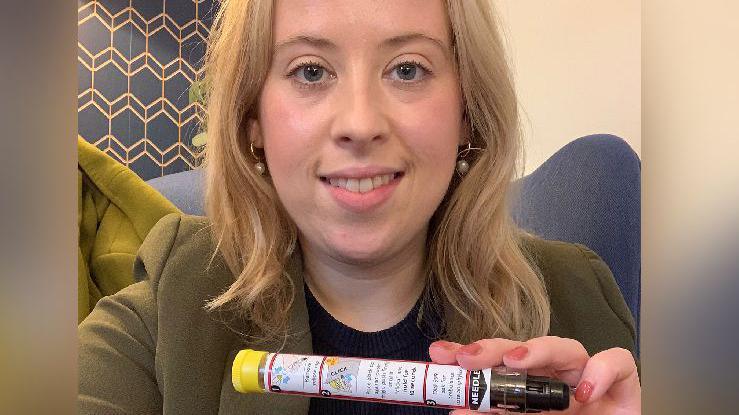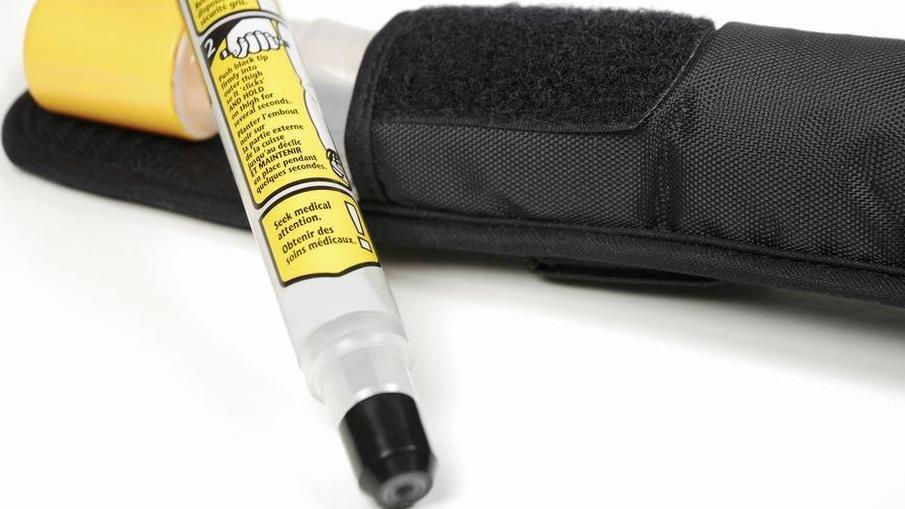Put adrenaline pens on trains, says MP with allergy

Becky Gittins keeps her adrenalin pen with her at all times
- Published
Adrenaline pens should be included in first aid kits on trains, a Labour MP with severe peanut allergy has said.
Clwyd East MP Becky Gittins said the pens - which are included in first aid kits in schools and by airlines - have saved "multiple lives", and that medicines regulations should be changed to protect train passengers with allergies.
She said she was diagnosed with peanut allergy aged seven after having a severe reaction to a chocolate bar containing peanuts at her school Christmas party.
Gittins is also backing the Natasha Allergy Research Foundation's call for the creation of an "allergy tsar" to coordinate action on allergies in the UK.
Peanut allergy warning over dips and sandwiches
- Published20 September 2024
Early peanut butter can give lifelong allergy defence
- Published28 May 2024
BBC presenter taken off flight over child's allergy
- Published27 May 2024
The charity was set up by the parents of Natasha Ednan-Laperouse, from Fulham, west London, who died in 2016 after suffering a severe allergic reaction to sesame baked into a Pret baguette.
Gittins said establishing an allergy tsar was about "not just making sure we are talking about" allergies, "but actually making sure that across lots of areas, we've got a coordinated approach to making life easier for people with allergies".
She said in her case, after her initial diagnoses, allergy testing later showed she had "some allergies to non-edible things like dust mites, hay fever, birch pollen, that sort of thing".
The MP, who was first elected in July's general election, told BBC's Politics Wales there are currently limitations on where adrenalin pens - commonly known by the brand name EpiPen - that are not prescribed to a specific person are allowed.
"The exemption exists for airlines, so aeroplanes are allowed to carry EpiPens, that currently don't exist for trains," she said.
"There are some medical reasons for that, around the administration of EpiPens and making sure that those are administered by trained people, but those exemptions currently exist in schools and I've seen in the news recently that that those have saved multiple people's lives."

Becky Gittins says adrenalin pens should be in first aid kits on trains
A train is an enclosed space and "often not the ability to move around if you're on a very busy train", she said.
"People do open snacks and the train cafes themselves do serve little bags of peanuts so trains can be a really dangerous place.
"I've not had anaphylaxis on a train before, but I've had to move many times because I'd begun to react, though my breathing became laboured or my lips began to swell, my eyes began to itch.
"But I know people with other allergies that I've had real close shaves on trains."
The Department of Health and Social Care said: "We know allergies can have a debilitating effect and are working closely with a range of stakeholders across government, the NHS, voluntary organisations and patient representative groups to consider how allergy care and support could be improved.
"Government officials have been in discussions with the Natasha Allergy Research Foundation, and ministers will carefully consider their views."
You can watch more on this story on BBC Politics Wales on BBC One Wales on Sunday 13 October and then on iPlayer